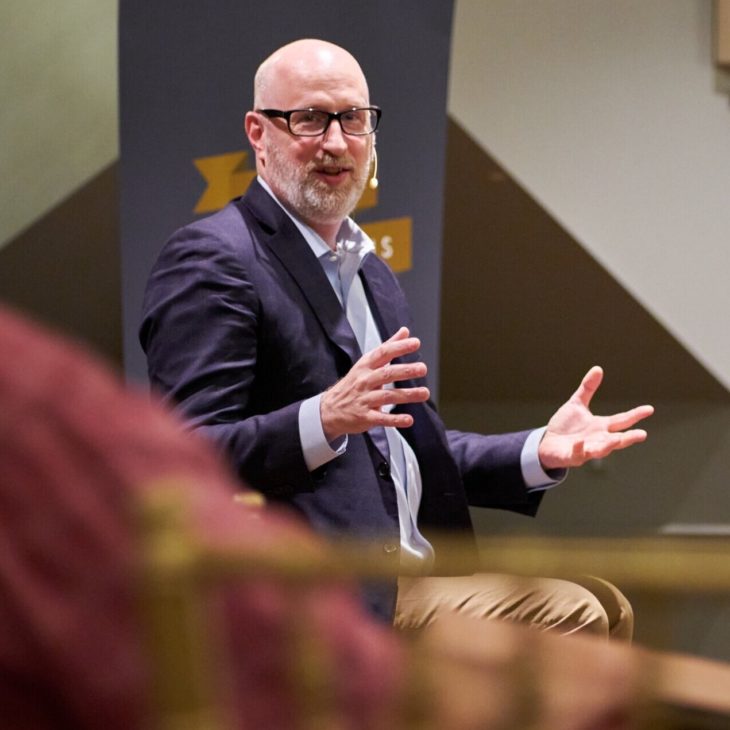Evangelical Christians and American Pluralism: A Conversation with David French
November 19, 2021

For about a year now, I’ve been telling anyone who will listen to read David French’s excellent book “Divided We Fall.” I’ve been especially emphatic about this to my fellow progressives, particularly those who fervently claim that white Evangelical Christians are basically responsible for all of America’s evils. Over 80% voted for Trump, my tribe will tell you. What else do you need to know?
French is a very vocal member of that other 20%. In “Divided We Fall,” he lays out an inspiring vision for American pluralism from the perspective of an Evangelical Christian with deep and authentic conservative commitments. It is an exercise in American civil religion, which is to say a genuine sacralizing of the nation’s principles and structures of pluralism.
I recently interviewed David for a series called Courageous Conversations in Barrington, Ill., started by friend and IFYC board member Jessica Green, and had an opportunity to delve more deeply into some of the themes of the book. (Here’s the video of the full discussion.)
I opened the conversation by asking David about his experiences as an Army lawyer in the Iraq war. He was stationed in Iraq during 2008 – a period of intense violence between different religious groups – and was a first-hand witness to the horrible things human beings can do to one another in a faith-based conflict. The narrative of each group, David noted, was substantially true. Sunnis had visited violent atrocities upon Shias, and Shias had done equally horrible things to Sunnis. The logic of the conflict seemed to be, I will never let those evil people rule. It was a principle people died and killed for.
In this context, David found himself exceedingly grateful for American pluralism, which he understood as the commitment that people with different identities who fundamentally disagree on some important things can still work together on other important things. Moreover, they recognize that they are parts of a larger entity, and that they all have a responsibility for the health of the whole. David experienced this with intensity during his time in the American military. People of all races and religions, with political beliefs that spanned the spectrum, viewed themselves as committed to a common cause, and were willing to give their lives for that mission, and one another.
When David returned to the States after his service in Iraq, he was invited to join a conference call that could, in the words of a highly partisan friend, “change the course of history.” It was about Obama being a Muslim, and a traitor. David hung up the phone. As he writes in his book, “My time in Iraq had changed me … If I had been willing to die for (my political opponents) while I was wearing the uniform of my country, why should I regard them as mortal enemies today?”
The manner in which politics increasingly feels like a kind of war in the United States worries David deeply. One solution for this lies in a most basic and beautiful thing: friendship. During his service in Iraq, David became friends with an individual named Leo. Leo was a fervent Obama supporter during the period when David and his wife were heavily involved in Republican presidential campaigns. David and Leo disagreed on virtually everything when it came to politics, but they knew they would give their lives for each other in the context of war. Leo was ecstatic when Obama defeated John McCain in the 2008 presidential race. He went to the inauguration and sent David a gift from the National Mall: a picture of George W. Bush’s helicopter flying away.
“Everyone needs a Leo,” David told the audience, someone who you disagree with profoundly, and love even more fiercely.
Everyone also needs a deeper appreciation for America’s religious pluralism. Iraq, after all, had come apart along the lines of religion (tensions, it should be said, that existed long before the American invasion). The United States is the most religiously diverse nation in human history and the most religiously devout nation in the Western Hemisphere. While there is certainly too much ignorance and bigotry with respect to different religions in America, there is simply no comparison with the all-out religious civil war in the manner that David witnessed in Iraq circa 2008.
In this regard, the United States is more the exception than the rule. Religious conflict has been a defining feature of many societies over the course of history; a healthy religiously diverse democracy is rare and precious. What is the secret of the American achievement on the question of religious pluralism? A big part of the answer, for David, is the genius of the 1776 generation of European founders. While their sins and mistakes – on race, gender and class, to name just a few – were legion, when it came to the question of how you build a religiously diverse democracy, they were remarkably prescient.
Share
Related Articles
First, some basic history. The Europeans settlers who populated the eastern seaboard of what was to become the United States were from a wide variety of religious groups – Puritans in Massachusetts, dissenters from those Puritans in Rhode Island, Quakers in Pennsylvania, Catholics in Maryland and Anglicans in Virginia. As David puts it, “The different sects represented many of the combatants in the Wars of Religion, arguably the most devastating conflict on the European continent before the modern world wars.”
How to build a national community from this fractious population? Europe’s solution was the Treaty of Westphalia, which basically assigned each religion a different nation – the Catholics to France, the Protestants to England. Madison, Washington, Jefferson, Franklin, Hamilton and Adams went a different route, one that had never been attempted in a large-scale democracy. Diverse religious groups would share a single country and be devoted to one another’s freedom as a way of protecting their own. As David puts it, “The First Amendment’s twin religious freedom guarantees – the guarantee of free exercise of religion and the guarantee of freedom from an established church – worked together to protect the theology, value, and autonomy of distinct religious communities.”
The point here is not to paper over the sins and mistakes of the European Founders when it comes to race, gender and class. It is to say that our experience in getting the structures regarding religious pluralism right can serve as an inspiration and a guide about other dimensions of identity and areas of disagreement. If Catholics and Protestants, who fought dozens of deadly wars over the course of centuries, can work together today in American cities, surely so can Republicans and Democrats. If the 1776 generation could conceive of a relative religious equality, perhaps that can inspire us towards greater creativity in how we address the cardinal sin of the 1619 generation: horrific racial inequality.
For David, there are four practices to focus on especially.
The first is to protect one another’s civil liberties. Conservative evangelical Christians should know that an erosion of civil liberties for progressive Muslims or Jews will inevitably mean an erosion of civil liberties for their own communities some time down the road. The reverse is true as well. Progressive Jews and Muslims ought to recognize that taking away rights from evangelical Christians puts their own rights of expression and association at risk.
Secondly, to recognize that left and right are unlikely to be very persuasive to the other. Rather, it is what David calls “in-group dissidents” who have the best shot at moving the opinion of their own tribe away from divisive partisanship and towards cooperative pluralism. Such people face powerful headwinds by extreme elements within their communities. David endures hate mail and death threats on the regular. He does the work because he thinks American pluralism is worth it. The least that those of us who disagree with him politically (as I do, on important matters like the war in Iraq) can do is be good-faith interlocutors rather than another group joining the pile on.
Third, when we do find ourselves in a political disagreement, we should engage the best version of our opponent’s argument, not the worst. David told me that he made it a point to read the views of people he admired that he disagreed with, not the views of people he had no respect for. Intellectual life in a diverse democracy means appreciating different views enough to attempt to understand why people might hold them.
Fourth, we should cherish the way American life organically brings people from different identities and ideologies together in ways that are both pedestrian and profound. You don’t have to go to war to build relationships with and appreciate the contributions of people you probably disagree with on lots of topics. There are people you rely on everyday – people who fight fires and fly planes and farm fields – who didn’t vote the way you did. Despite fundamental differences, they still keep your home from burning down, land your plane safely and grow the food that feeds your family. Let’s cherish these ways that we contribute to one another’s lives despite our disagreements.
Part of what I found so beautiful about my conversation with David French is that we both agree that American pluralism is not simply a pragmatic solution to the challenge of a diverse democracy, it is also a kind of sacred trust that God intends us to steward. I believe that as an Ismaili Muslim, David believes that as an evangelical Christian.
Towards the end of the evening, I noted that the median age of American Muslims, Buddhists and Hindus is in the mid-30’s. By contrast, the median age of white Christians in this country is in the mid-50s. Simply as a demographic fact, America is shaping up to be far more religiously diverse in the future than we are today. What excites you about that, I asked David, and what concerns you.
David lit up right away. He was excited that this growing diversity meant that America was living into its promise. We were meant to be diverse, he said. That’s the nature of our country.
What makes him nervous? He put the issue bluntly: How many successful continent-wide hyper-racially and religiously diverse democracies do you know? he asked. A kind of nervous hush fell over the audience. It’s a really hard thing to do, he said.
David Brooks recently wrote about how dictators like Vladimir Putin are suffusing their regimes with religious references, effectively saying that God is on the side of their totalitarian rule. Those of us who believe in healthy diverse democracies, Brooks continues, “have no choice but to fight this on the spiritual and cultural plane as well, to show that pluralism is the opposite of decadence and is a spiritual-rich, practically effective way to lift human dignity and run a coherent society.”
What better way to do that than to have a positive conversation about the beauty of diversity with someone that you disagree with both politically and religiously.
It’s not just a civic act, it’s a sacred one.
This article was originally published on September 14, 2021.



